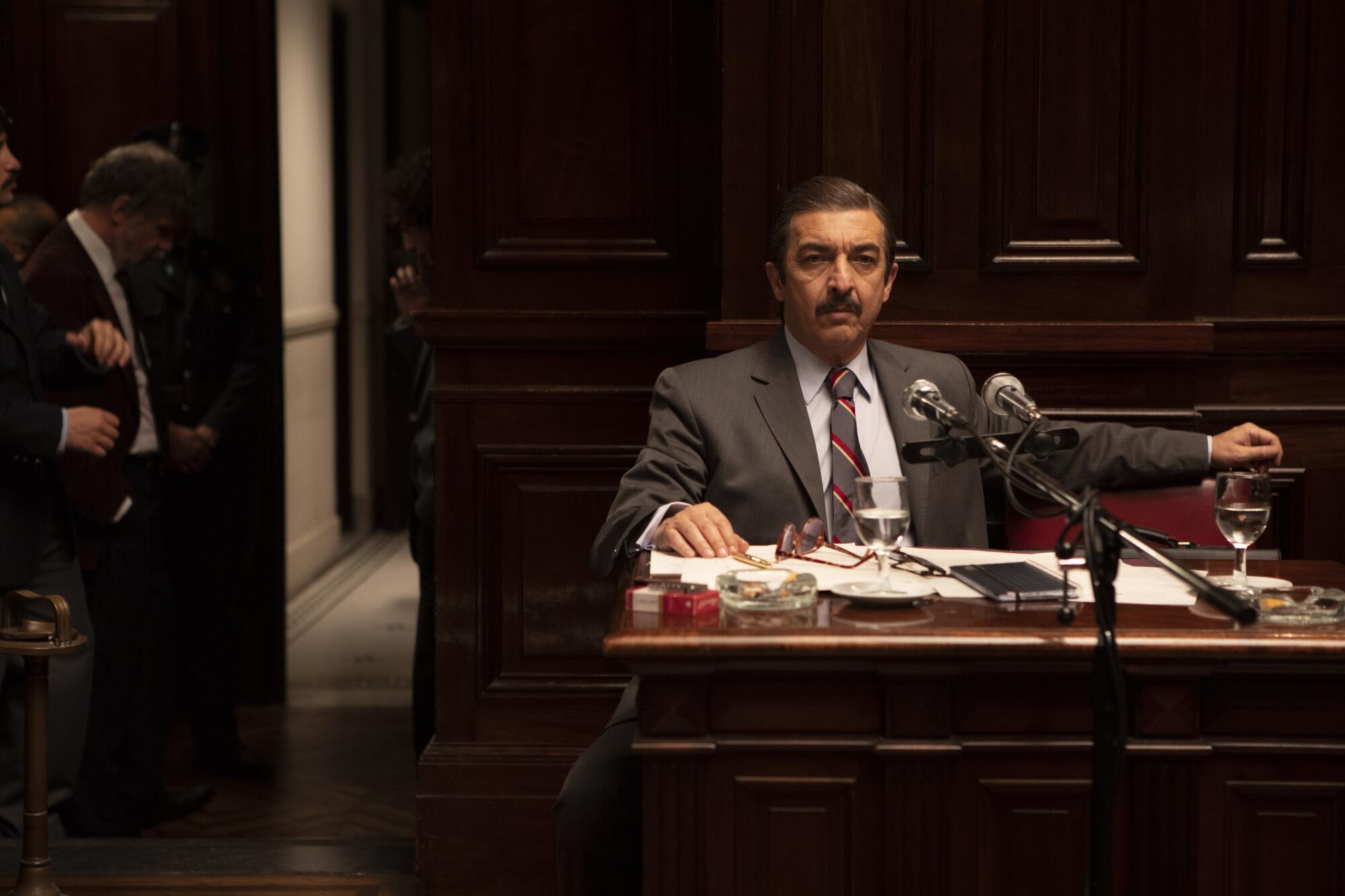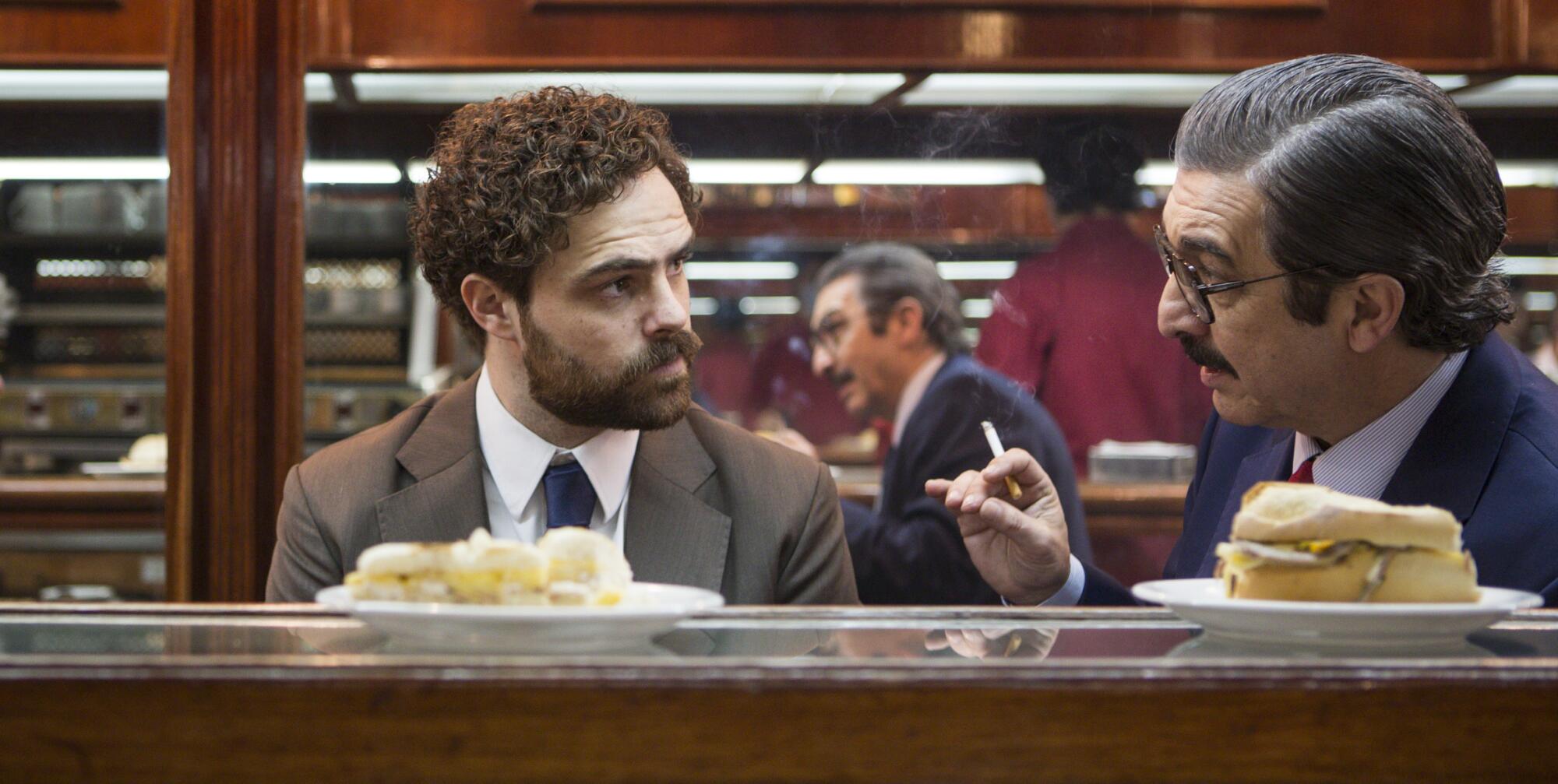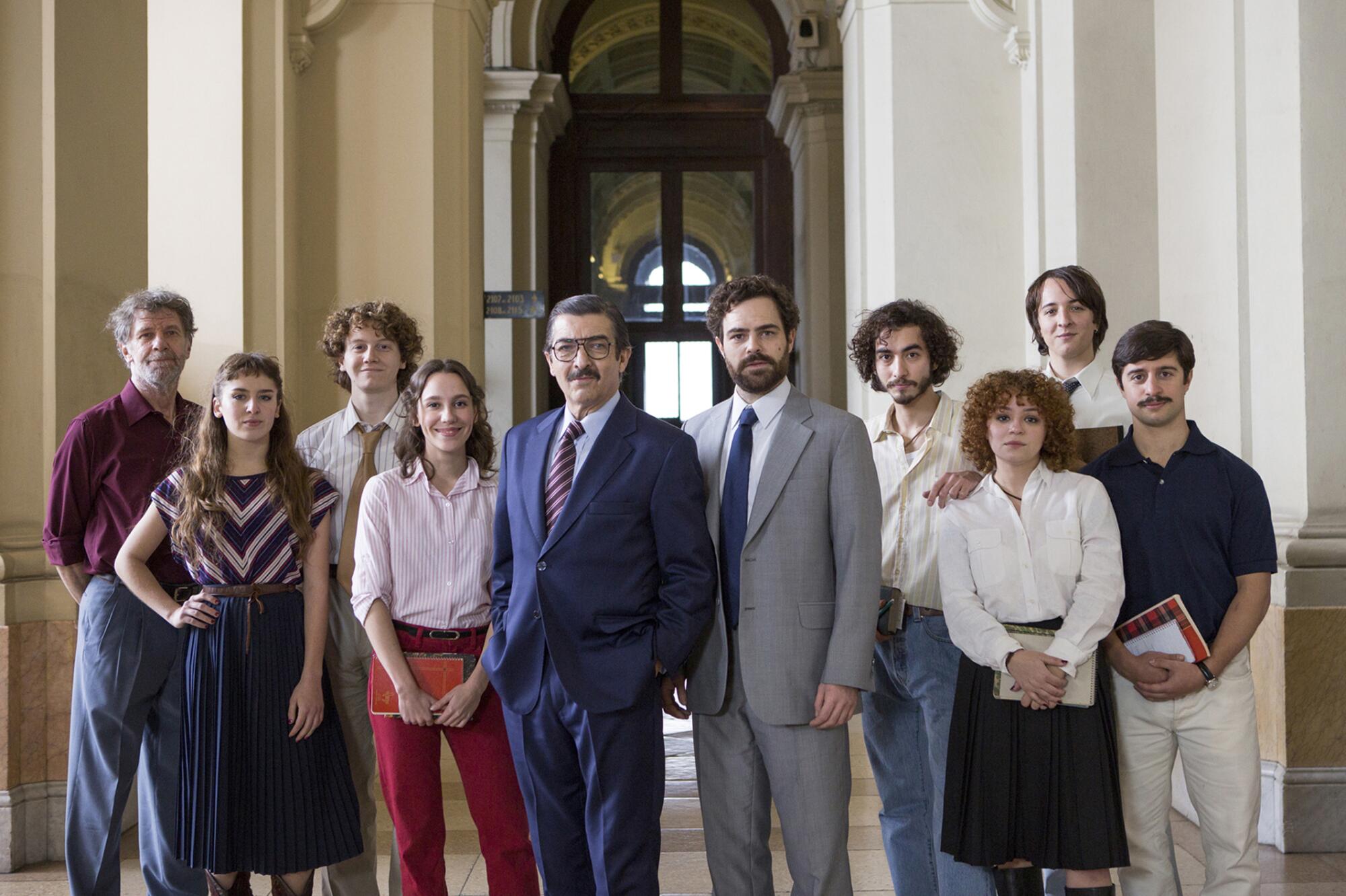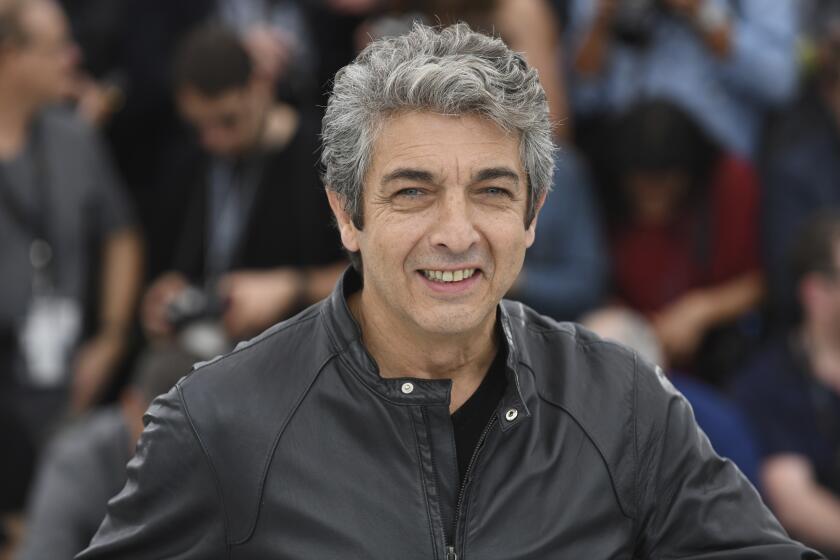
- Share via
This isn’t the first time that actor Ricardo Darín has helped shine a light into one of the dingiest rooms in Argentina’s history: the military dictatorship that staged a right-wing coup d’etat and ruled his country between 1976 and 1983, during which as many as 30,000 people may have been murdered and disappeared.
He did it before, playing a former criminal investigator in director Juan José Campanella’s “The Secret in Their Eyes” (2009), which won the Oscar for foreign film. In “Kamchatka” (2002) he portrayed a research scientist hiding out with his family from the military police. And in “Kóblik” (2016) he starred as a former Navy pilot who becomes a marked man after disobeying an order to take part in so-called “death flights,” in which purported enemies of the junta were stripped, drugged and thrown out of airplanes and helicopters.
But he’s added a new twist in “Argentina, 1985,” which premieres Friday on Amazon Prime Video and is Argentina’s Oscar entry for international film. It’s the first time he’s played a real person from that bleak era, Julio César Strassera, a revered figure who’s rightly regarded as a defender of Latin American democracy. An Argentine lawyer, Strassera served as chief federal prosecutor in the 1985 trial of the military leaders responsible for massive human rights crimes.
“I am especially honored to have played this great man — who was incorrectly called ‘common’ or ‘simple’ — within a context in which he and his team had to put aside all their fears and uncertainties,” Darín said, speaking by phone.
Strassera and his assistant Luis Moreno Ocampo (played in the film by Peter Lanzani) faced “a titanic task,” Darín said, in putting together a case for which there was very little “tangible evidence” that directly and personally connected the heads of the armed forces to waging the so-called Dirty War. The crimes waged during this era included assassinations, torture, rape, forced exile and the kidnapping and trafficking of minors who’d been snatched by government agents from their imprisoned and murdered parents.

Several of the main commanders were sentenced to life imprisonment, including Jorge Rafael Videla, head of the army, who was later pardoned by President Carlos Menem, arrested again and finally imprisoned until his death in 2013. Strassera died in 2015.
“I believe that all of this was achieved due to the efforts of many people who, in some cases, responded to the prosecution’s call to give testimony before the court,” Darín said. “Democracy had just been restored, and a lot of people didn’t really believe that this trial was going to take place, even after it was announced.”
“Argentina, 1985” is the second collaboration between Darín and director-screenwriter Santiago Mitre following “La Cordillera” (2017), in which the actor portrayed a fictional Argentine president of dubious morals, reminding some viewers of Mauricio Macri, a neoliberal businessman who served as president between 2015 and 2019.
“When I made that film with Ricardo, I discovered that, in addition to being a talented actor, subtle and extremely precise in the way he works and uses his dramatic resources, he is a filmmaker, a person who thinks about cinema in all its aspects,” Mitre said. “He was the first I thought of to tell this story, and he told me right away that he would play Strassera.”

When the first hearing of the so-called Juicio a las Juntas convened, Darín already had begun working as a young actor, enjoying a minor but growing fame from roles in film, theater and television. He didn’t hear the eloquent and moving speech with which the prosecutor closed his argument in court, which is reproduced in the film.
“This happened almost 40 years ago, when the world of communications was completely different,” Darín said. “On television only some fragments of the trial were shown, only with images that did not have audio, and all the testimonies were presented from behind, without showing the faces of those who spoke, to protect the victims and the survivors.”
An audio recording of the speech was later released, and the film makers consulted other historical sources. But they weren’t trying to imitate real events or stage a period piece.
“What we’re trying to do is capture what these people were thinking and doing at the time,” he said. “We tried to imagine all that, and hand in hand with a script as well-written as the one that was used, we formed a team in which we fed each day with a little more information. But we always had the objective not to copy and to reserve a small space of freedom in terms of imagination, because we have to remember that this is a film that recreates the trial, but that also appeals to fiction by showing situations that did not exactly happen that way.”
Mitre and his co-screenwriter Mariano Llinás conducted several interviews with the deputy prosecutor, Luis Moreno Campo, and met with Strassera’s widow, Marissa, his son Julián and most members of the team of prosecutors.
“A lot of the scenes we show are directly inspired by what these people told us, and spending time with these same people made me bond with them,” the filmmaker said. “When they saw the film, they felt good about the way it portrays what happened and the role they played in the trial.”
“Of course, outside of any political discussion, what we wanted to do was a good movie, that could dialogue with the audiences of this time and with the viewers who knew nothing of the process that took place in those times,” he added.
To that end, Mitre wanted to make the movie’s visual and narrative style accessible in the manner of a classic Hollywood courtroom drama.
“I was thinking about John Ford, about [Frank] Capra, about [Howard] Hawks, about Billy Wilder,” Mitre said. “And although it may sound pretentious, sometimes your references also have to do with the art world.”
Strassera also personified the “hero in spite of himself,” a classic cinematic archetype, Mitre continued.
“We were also looking for the tension of contemporary cinema, and in that sense, we thought of ‘All the President’s Men’ and ‘The Post ‘ by [Steven] Spielberg, where there’s a very energetic concept of group work,” he added. “Nor should we forget about Latin American cinema.” He cited Pablo Larraín’s “No” (2012), starring Gael García Bernal, about a plebiscite that led to the unraveling of Gen. Augusto Pinochet’s dictatorship, as “a great film that also narrates a democratic transition, although it is the Chilean one, which was very different from the Argentine one.”
In “Argentina 1985,” Darín, who is 65, plays a man who was in his early 50s when the Juicio a las Juntas began. His deputy, Moreno Ocampo, was much younger (33 at the time), as was most of the rest of the prosecutorial team — a contrast that underscores the gap between how older Argentines recall (or choose to forget) the Dirty War while younger Argentines attempt to piece it together.

“When we started this project, we realized that people had very little recollection of this trial, which showed us how important it was to tell this story not only to young people in our country, but also to those in different parts of the world,” Mitre said.
“It was necessary to prove that the search for justice is necessary to consolidate a democratic ideal,” Mitre said, particularly at a time like the present in which democracy is being undermined and losing support among young people who haven’t experienced the horrors of dictatorship and may take democracy and the rule of law for granted.
The connection that the film seeks with young people hasn’t gone unnoticed by Darín.
“If there is a possibility that this film has a message, it is found precisely in the youngest, because it is understandable that people who were born under a democracy do not realize the dimension of what happened, all the suffering and obstacles they had to go through.”
“We live in an era,” he continued, in which young people “are glued to their phones all the time.”
“But reality is reality: There was torture, there were disappearances, there were atrocious actions against people who had absolutely nothing to do with the accusations made against them, and which occurred simply because they were on a detainee’s agenda or because someone pointed a finger at them.”
Regardless of political ideology, the trial depicted in “Argentina, 1985” argues that there must be standards of right and wrong that apply to all humanity.
“After that, you can have whatever political position you want,” Darín concluded, “but you cannot fail to recognize that there are ethics, values and morals that must be respected.”
More to Read
The biggest entertainment stories
Get our big stories about Hollywood, film, television, music, arts, culture and more right in your inbox as soon as they publish.
You may occasionally receive promotional content from the Los Angeles Times.












